News & Media
Meaningful engagements required to achieve gender transformation
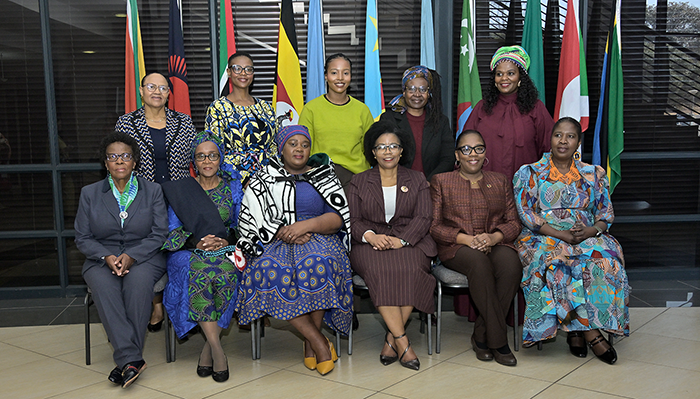
Izimbokodo dignitaries at the Unisa-SAWID Women's Month Dialogue
Unisa, in partnership with South African Women in Dialogue (SAWID), held a Women’s Month Dialogue on 20 August 2025, themed "Celebrating women for their strength and resilience: Exploring the role of creative arts, technology and mental health initiatives to accelerate change". The dialogue reaffirmed and recognised the contributions of South African women in breaking societal barriers and leading transformation in various sectors.
Other than reflecting on lessons from the past and charting a more inclusive, equitable and resilient future, the dialogue also enabled participants to explore partnerships for gender-specific interventions focused on equality, mental health and human dignity.
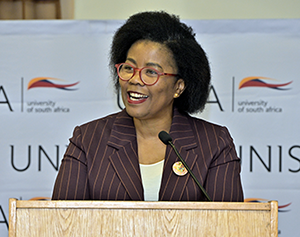
Prof Puleng LenkaBula, Principal and VC: Unisa
Delivering the welcome address, Unisa’s Principal and Vice-Chancellor (VC), Prof Puleng LenkaBula, said that women, diverse as they are, should partner in the imagination of their futures, having learnt from resilient women who existed before them. She added: "These women fought for the liberation of this country, and advanced the dignity of women, their voices and participation in improving societies and contributing to knowledge creation, as well as to economic and political progress of the country".
The VC also encouraged women to be the centres of excellence in their communities. "This annual dialogue is important as women continue to advocate for women's empowerment, gender equality and gender justice," said LenkaBula. "We are gathered here today because of the women of 1956 and prior, who ensured that women’s humanity, dignity and urgency were an integral part of the anti-apartheid movement and the emancipation of the country." She also expressed her appreciation for women across the African continent who ensured that African women were free from the chains of colonialism, imperialism and apartheid.
Watch a recording of the dialogue
Embracing change and empowerment for transformation
Speaking on the theme, Vatiswa Moea, SAWID’s Executive Director, said that the stigma around mental health should be ceased. She also posited that the arts do not exist for entertainment only, but they also possess messages that can be used to advance transformation. Encouraging everyone to embrace technology, Moea remarked: "The dialogue recognises that we are constantly in a state of catching up with the evolving world".
Dr Hazel Gooding, Deputy Representative for the United Nations (UN) Women South African Multi-Country Office, affirmed that women's empowerment and well-being are not luxuries but the foundations of activism and leadership. Gooding also lauded artists, such as singer Dr Miriam Makeba, for using art to challenge stereotypical social norms and amplify the voices of marginalised experiences.
Women to reclaim their power
Delivering the keynote address, the Honourable Mmamoloko Kubayi, Minister of Justice and Constitutional Development, said that without meaningful engagements that can lead to real change, Women’s Month would be devalued and gender transformation would not be achieved. Kubayi also acknowledged that the issues of arts, technology, mental health and social transformation are at the core of issues faced by women. If they are appropriately dealt with, that can help transform society towards gender equality. "Therefore," she continued, "I am delighted to engage in this important societal discourse, which remains relevant as long as women are victims of gender biasedness in our society."
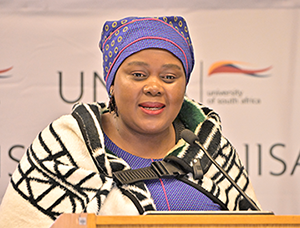
Hon Mmamoloko Kubayi, Minister of Justice and Constitutional Development
Kubayi remarked: "Women are born with two choices. Firstly, they either fight to break down the walls of gender biasedness and patriarchy, or, secondly, they accept being second-class citizens after their male counterparts. For those of us who have chosen to fight, we have our work cut out for us." She added, "Gender inequality is an injustice that cannot be left unattended. Just like the beneficiaries of capitalism, the beneficiaries of patriarchy and gender inequality have convinced themselves that the world was created with religious and cultural practices, institutions and structures that are designed to place them at an advantage, but at the cost of women."
Reiterating the importance of education, Kubayi maintained that a lack of access to education for women would exacerbate gender biasedness. She further urged institutions of higher learning to drive a purposeful and gender-balanced education system. Kubayi said: "Women are not weak; they are attacked unnecessarily and are marginalised from equal opportunities". She encouraged women to reclaim their power, to support each other and take up leadership roles.
Provocative insights shared on women's advancement
Different sub-themes that aligned with the dialogue’s main theme were tackled during a panel discussion. Dr Liepollo Pheko, Commissioner of the National Planning Commission, maintained that sustainable development also entails economic sustainability and the social ecology of relationships. For Dr Charity Mkone, Clinical Psychologist, mental health is framed against mental illness, and emotional awareness and insight should be tools for social transformation.
The Programme Manager for Wakamoso Africa, Nonkululeko Mbalu, stated that technology has become a catalyst for African innovators to ideate solutions that are specific to Africa’s context.
Rekopile Belebesi, interior designer, and media and arts specialist, emphasised that the arts should not merely be treated as a craft or commodity to be exploited, but rather be embraced as a vital source of cultural wealth, a fountain of creativity, and a legacy to be preserved for future generations and financial independence.
She called on women artists and practitioners, as well as followers of the arts, to shift their mindset. "Artists," she said, "should not restrain themselves to being humble and financially strained but should actively navigate the intersection between art and business. Understanding and leveraging the commercial aspects of the arts will empower women to dictate the terms of their creative production, transforming their craft into a sustainable financial resource and a tool for social empowerment."
In her vote of thanks, Dr Sizakele Matlabe, Deputy Chairperson of Unisa Women’s Forum, said that Unisa and SAWID are collaborating to promote the university’s Catalytic Niche Area on Feminist/Womanist/Bosadi theorisations. She concluded: "Importantly, this dialogue highlighted the issues that women still face in a democratic society, and the solutions to these".
* By Nancy Legodi, Acting Senior Journalist, Department of Institutional Advancement, with additional reporting by Dr Daniel Rankadi Mosako, Chair of the Department of Art and Music
** Photography by Shooheima Champion, Unisa Multimedia Office
Publish date: 2025-08-25 00:00:00.0


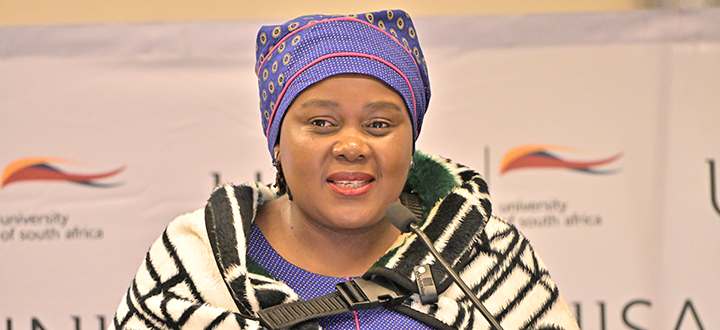 Meaningful engagements required to achieve gender transformation
Meaningful engagements required to achieve gender transformation
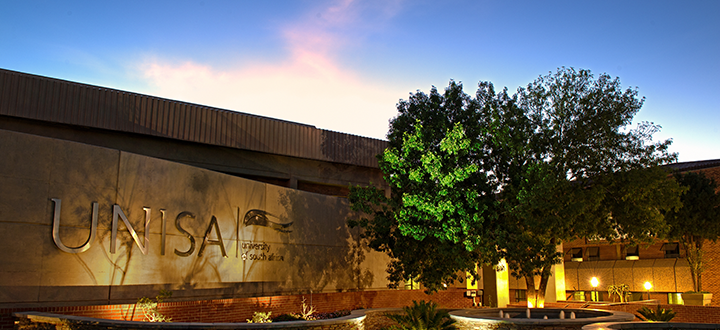 Unisa moves up in the ARWU list of top 1 000 international universities
Unisa moves up in the ARWU list of top 1 000 international universities
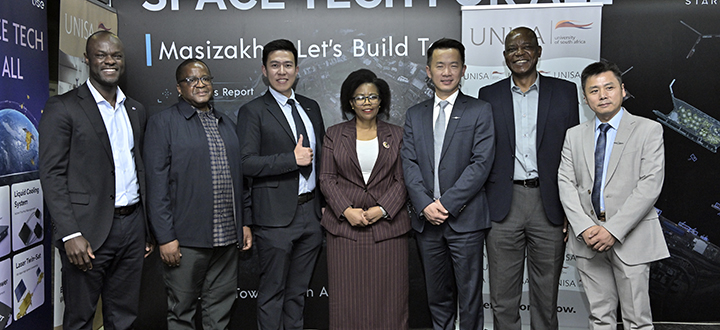 Unisa shoots for the stars with strategic international partnership in space sciences
Unisa shoots for the stars with strategic international partnership in space sciences
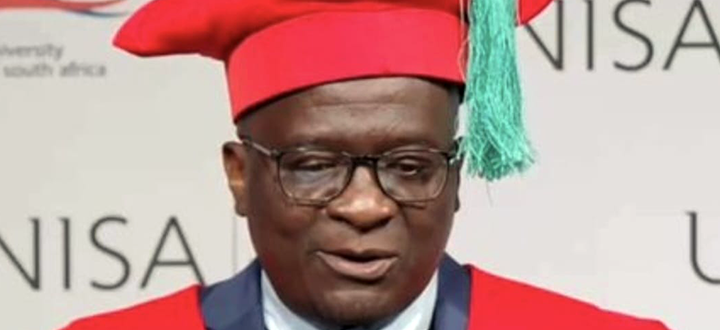 School ecosystems demand a new type of leadership
School ecosystems demand a new type of leadership
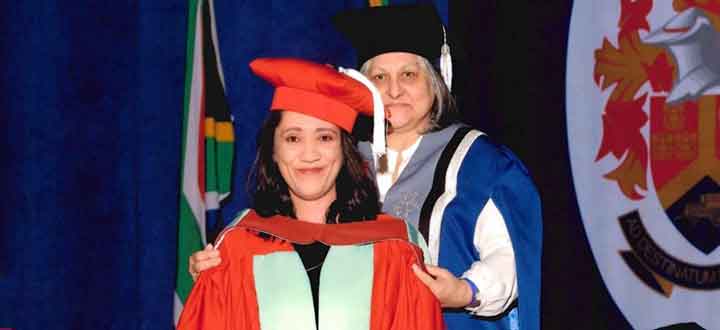 Governance, grit and growth
Governance, grit and growth